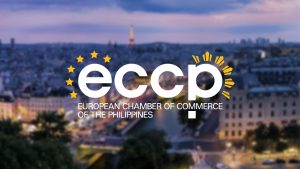By Alyssa Nicole O. Tan, Reporter
THE European Chamber of Commerce of the Philippines (ECCP) is confident that officials of the new administration will deal with corruption in a “pragmatic” manner, and called for improvement in the area of respect for contracts during the Marcos term of office, its president said.
In a video call with BusinessWorld, ECCP President Lars Wittig said that “corruption remains a very big challenge” in the Philippines, but added that he had a positive view of the team put in place by the new government.
“They are speaking the business people’s language, they are very pragmatic, and I think they will ensure that we will see significant improvement,” he said.
Mr. Wittig also said that the Philippines needs to become more dependable in terms of the validity of contracts.
“There are rules to the game… you don’t like to see contracts or rules change, so we have to have more reliability here,” he said, calling this an “ongoing concern” for the Philippines.
“I also think that in that regard, the answer now (is) with the new government,” he added.
He said the previous government “had very strong and good efforts to eliminate (corruption),” but “was very challenged in succeeding.”
The Philippines slumped to a historic low on the 2021 Corruption Perceptions Index released in January 2022. It dropped two spots to 117th out of 180 countries and territories.
Transparency International said the Philippines scored 33 out of 100 on a scale measuring perceived levels of public sector corruption.
In 2021, the Philippines scored 34. The scale defines a 100 score as “very clean” and zero as “highly corrupt.”
“Since the election of Rodrigo R. Duterte (in 2016), the Philippines has also seen a sharp decline in freedom of association and freedom of expression, making it harder to speak up about corruption,” Transparency International said.
Danish Ambassador Franz-Michael S. Mellbin also said at a news conference on Wednesday that to contain corruption, the administration will have to demonstrate political will and move forward with digitalization.
“Political will is more important than legislation,” Mr. Mellbin said. “It can take time in a country like the Philippines. You will have petty corruption and you will also have big corruption, lots of money, powerful people, and those need to be tackled in different ways.”
“With petty corruption, one thing that the country could do is digitalization, and this is one of the things that I will be working on,” he added, noting that Denmark is a world leader in government digitalization.
Denmark is interested in working with the Philippines on bringing its processes online, saying the transition will help the country reduce costs and cut down on opportunities for corruption.
“It’s a win-win situation except for the person pocketing the money,” he said.
Mr. Mellbin added that “corruption is friction, it (makes business) less predictable, and it’s embedded in the legislature.”
“Denmark has the least corruption in the world, so corruption is actually extra worrying for Danish investors,” he added, referring to the Transparency International Corruption Perception Index rankings.
The ambassador said red tape is also an issue.
“Red tape has to come down. It is a business killer, and you’re great at red-taping but it does not help businesses a lot,” he said.
Cumbersome government processes are one of the biggest worries of Danish investors and business leaders, dampening their interest in operating in the Philippines.
“There’s one more thing that worries investors, and that’s the energy crisis,” Mr. Mellbin said. “So, if you want to come to the Philippines and you’re into manufacturing, then you will worry about: if I make a large investment, what will the energy profile look like, and how can I be certain?”
“I think this is an important point because what I am seeing now is that a lot of European companies are looking to the Philippines as an opportunity because they want to move part of their manufacturing and sourcing out of China and to somewhere else,” he added.
Many foreign investors are turning to the so-called China-Plus-One Strategy, retaining operations in the Mainland while investing in another non-China location in case supply chains are disrupted.
“Danish companies are very invested in the Chinese market and it has been very profitable to them, so they’re not just going to abandon China, but they will diversify out of China,” the ambassador said.
“So the strategy is China Plus One, so the question is who is the plus one. Is it the Philippines, Malaysia, Thailand, Vietnam? There are many options, and I hope that together with the government and the business community here, let’s put Philippines on the map and make sure you’re the plus one,” he added.
